The Driving Force of Spiritual Powers in World History
GA 222
Lecture VI
22 March 1923, Dornach
To begin with today we will remind ourselves of the indications I have given you concerning the real nature of human thinking. In the present age, since the well-known point of time in the 15th century, our thinking has become essentially abstract, devoid of pictures and imagery. People take pride in this kind of thinking which as we know, did not begin to be general until the above-mentioned epoch; previously to that, thinking had been pictorial and was therefore a living thinking in the real sense.
Let us remind ourselves of the essential character of thinking as it is today. The living essence of thinking was within us during the period between death and rebirth, before we descended from the spiritual into the physical world. This living essence was then cast off and today, as men of the Fifth postAtlantean epoch, our thinking is the corpse of that living thinking between death and a new birth. It is just because our thinking now is devoid of life that our ordinary-level consciousness as modern men makes it so easy for us to be satisfied with comprehending the lifeless and we have no aptitude for understanding the living nature of the world around us.
True, we have thereby acquired our freedom, our self dependence as human beings but we have also shut ourselves off entirely from what is involved in a perpetual process of ‘becoming’. We observe the things around us in which no such process is operating, which are incapable of germination and have a present existence only. It may be objected that man observes the germinating force in plants and animals, but actually he is deceiving himself. He observes this germinating force only in so far as it is the bearer of dead substances; moreover he observes the germinating force itself as something that is dead.
The essential characteristic of this kind of perception is indicated by the following: In earlier epochs of evolution men perceived an active germinal force everywhere in their environment, whereas nowadays they have eyes only for what is dead; they hope somehow to grasp the nature of life too, merely by observing what is dead. Hence they do not grasp it at all!
Therewith, however, man has entered into a quite remarkable epoch of his evolution. Nowadays, when he observes the sense world, thoughts are no longer given to him in the way that applies to sounds and colours. From what I say in the book Riddles of Philosophy, you know that thoughts were given to the Greeks just as sounds and colours present themselves to us today. We say that a rose is red ; the Greek perceived not only the redness of a rose but also the thought of the rose, that is to say, he perceived something spiritual. And this perception of the purely spiritual has gradually died away with the rise of the abstract, lifeless thinking that is only a corpse of what thinking was in us before our earthly life.
But now the question arises: If we want to understand Nature, if we want to form a world-conception for ourselves, how are the sense-world outside us and the dead thinking within us to be related to each other? We must be quite clear that when man confronts the world today, he confronts it with lifeless thinking. But then, is there death also outside in the world? There ought at least to be an inkling today that there is not. In the colours, in the sounds, at the very least, life seems to proclaim its presence everywhere! To one who understands the real nature of the senses the remarkable fact becomes clear that although modern man invariably directs his attention to the sense-world alone, he cannot grasp this sense-world by means of thinking, because dead thoughts are simply not applicable to the living sense-world.
Make this quite clear to yourselves.—Man confronts the sense-world today and believes that he should not allow himself to look beyond it. But what does this mean for modern man—not to be willing to look beyond the sense-world? It actually means renouncing all vision and all knowledge. For neither colour, nor sound, nor warmth, can be grasped at all by dead thinking. Man thinks, then, in an element quite other than that in which he actually lives.
Hence it is a remarkable fact that although we enter the earthly world at birth, our thinking is the corpse of what it was before our earthly existence. And today man wants to bring the two together ; he wants to apply the residue from his pre-earthly existence to his earthly existence.
And it is this fact which since the 15th century has constantly asserted itself in the sphere of thinking and knowledge in the form of doubt of every kind. This is the cause of the great confusion prevailing at the present time; it is this that has allowed scepticism and doubt to creep into every possible mode of thinking; it is this that is responsible for the fact that men today no longer have the remotest concept of what knowledge really is. There is indeed nothing more unsatisfactory than to examine theories of knowledge in their modern form. Most scientists abstain from this and leave it to the philosophers. And in this field one can have remarkable experiences.
In Berlin, in the year 1889, I was once visiting the philosopher Eduard von Hartmann, now long since dead. We spoke about questions connected with theories of knowledge. In the course of conversation he said that one should not allow questions connected with theories of knowledge to be printed; they should at most be duplicated by some machine or in some other way, for in the whole of Germany there were at most sixty individuals capable of occupying themselves usefully with such questions.
Just think of it—one in every million! Naturally, among a million human beings there is more than one scientist or, at least, more than one highly educated individual. But as regards real insight into questions connected with theories of knowledge, Eduard von Hartmann was probably right; for apart from the handbooks which candidates at the Universities have to skim through for certain examinations, not many readers will be found for works on the theory of knowledge, if written in the modern style and based on the modern way of thinking.
And so things jog along in the same old grooves. People study anatomy, physiology, biology, history and the rest, unconcerned as to whether these sciences bring them knowledge of reality; they go on at the same jog-trot. But a time will come when men will have to be clear about the fundamental fact that because their thinking is abstract it is full of light and therefore embraces something in the highest sense super-earthly, whereas in their life on Earth they have around them only what is earthly. The two sets of facts simply do not harmonize.
You may ask: did the thought-pictures current in days of old accord more fully with man's nature when his thinking was full of life? The answer is, Yes—and I will indicate the reason to you.
The human being of today is engrossed from his birth to his seventh year in developing his physical body; then comes the point where he is able to develop his etheric body as well—this takes place from the seventh to the fourteenth year. Then from the fourteenth to the twenty-first year he develops his astral body; until his twenty-eighth year the sentient soul; until his thirty-fifth year the intellectual or mind-soul; and after that the consciousness-soul. It can then no longer be said that he develops but that he himself is being developed, for the Spirit Self which will evolve only in future ages, already participates to some extent in his development from his forty-second year onwards. And so the process continues.
Now the period from the twenty-eighth to the thirty-fifth year in human life is extremely important. Conditions during this period have altered essentially since the 15th century. Until then, influences had continued to come to man from the surrounding cosmic ether. Because this is no longer the case today, it is difficult to imagine how man could have been influenced by the surrounding ether. Nevertheless it was so. Between their twenty-eighth and thirty-fifth years, human beings experienced a kind of inner revival. It was as though something within them was given new life. These experiences were connected with the fact that in his twenty-eighth year a man was raised to the degree of ‘Master’ in his trade; it was not until that age that he experienced a revival—of course not in a crude but in a delicate form. He was given a new impulse. This was because the all-encompassing ether-world worked upon him—the ether-world which, as well as the physical world, is all around us.
In the first seven years of life the ether-world worked through the processes operating in the physical body of the human being but it did not work directly upon him until his twenty-eighth year when the period of the development of the sentient soul was over. But then, when he entered into the period of the intellectual or mind-soul at that time, the ether worked upon him with a vivifying effect.
This no longer takes place and man would never have achieved independence today as an individual and a personality, had the process continued. This also has to do with the fact that the whole inner disposition of the human soul has changed since those days.
You must now accept a concept that may be extremely difficult for modern thinking to grasp but is nevertheless very important.
In physical life it is quite clear to us that what is going to take place only in the future, is not yet here. In etheric life, however, this is not so. In etheric life, time is, as it were, a kind of space and what will some day be present already has an effect upon what precedes it, as well as upon what will follow. But this should not be a matter for wonder; it is the same in the physical world too.
If we really understand Goethe's theory of Metamorphosis, we shall say to ourselves that the blossom of the plant is already working in the root. And that is indeed so. It is the case too with everything in the ether-world: the future is already working in what has gone before. Thus the fact that man was open to the influences of the ether-world had an effect upon the preceding life back to his birth, chiefly upon his world of thoughts. As a result his world of thoughts was different from the one that is his in the epoch in which we are living today, when the doorway between the twenty-eighth and thirty-fifth years is no longer open, when it is closed. There was a time when men's thoughts were truly alive. They made him unfree but at the same time they gave him a feeling of being connected with his whole environment; he felt himself to be a living member of the world.
Today man feels that he exists only in a dead world. This feeling is inevitable because if the living world were working upon him, it would make him unfree. Only because the dead world requires nothing of us, can determine nothing in us, can give rise to nothing in us—only because it is a dead world that is working in upon us are we free men.
But an the other side we must also understand clearly that precisely because of what man has within him now in complete freedom, precisely through his thoughts, which are dead, he can acquire no understanding of the life round about him; he can understand the death around him—and only that.
Now if there were to be no change in the attitude and mood of man's soul, the discordance in culture and civilization which is becoming more and more apparent, would inevitably increase and the inner assurance and resoluteness of the soul would progressively diminish. This would be even more apparent if men were to pay real attention to the knowledge they glean today from what is said to be irrefutable. But they still do not pay attention. They still content themselves with traditional religious ideas which they no longer understand but which have been propagated. Even in the sciences people content themselves with these ideas. When a man pursues any particular science he generally has no idea, when he begins really to grasp it, that he is still clinging to the old traditions, while the modern ideas which are only dead, abstract thoughts, do not even approach the sphere of the living.
In earlier times, because the ether worked in him, man could also come in touch with the living nature of the sense-world. When he still believed in the reality of the spiritual world, he could also grasp the essential nature of the world of the senses. Today, when he believes only in the world of the senses, the strange thing is that his thoughts, although dead, are now spiritual in the very highest degree! Here there is dead spirit. But man is not conscious of the fact that today he Looks into the world with the heritage of what was his before his earthly life. If his thoughts were still living, vivified by the surrounding ether, he could look into the living world of his environment. As, however, nothing comes to him from his environment and he has to rely only on what he has inherited from a spiritual world, he can no longer understand the physical world around him.
This is apparently paradoxical but for all that an extraordinarily important fact. It provides the answer to the question: Why are modern men materialists? They are materialists because they are too spiritual! They would be able to understand matter everywhere if they could comprehend the life that is present in all matter. But because they confront the life with their dead thinking, men make this life itself into something that is dead and see lifeless substance everywhere. It is because they are too spiritual, because they have within them only what was theirs before their birth, that they become materialists. A man does not become a materialist through knowledge of substance—in point of fact he has no real knowledge—but he becomes a materialist because he does not live on the Earth in the real sense.
And if you ask why hardened materialists, such as Büchner, Vogt and the rest, have become such out-and-out materialists, the answer is: because they were too spiritual, because they had nothing within them that connected them with earthly life, but only what they had experienced before their life on Earth—and this was dead. This remarkable phenomenon in human civilization, this materialism, is in truth a profound mystery.
Now in the present epoch, because his thoughts are no longer imbued with life from without, from the ether, man can transcend his dead thoughts only by instilling life into them himself. And the only possibility of doing this is by instilling life as conceived in Anthroposophy into his world of thoughts, by imbuing his thoughts with life and then penetrating into the life inherent in the world of the senses. He must therefore vivify himself inwardly. He must himself impart life to dead thoughts through inner activity of soul, and then he will overcome materialism. He will begin to judge everything around him differently. And from this very platform you have heard a great deal about the many possibilities of such judgments.
Let us focus our attention today on a particular subject: the plant-kingdom in our environment. We know that many plants are consumed as foodstuffs by animals and human beings and are worked upon in the processes of nourishment and digestion. In the way generally indicated they can be assimilated into the animal and human organisms. And now we suddenly come across a poisonous plant, let us say henbane or belladonna. What have we there? Suddenly, among the other vegetation, we find something that does not combine with the animal and human organisms as do other plants.
Let us be clear in our minds about the basis of plant-life. I have often spoken about this. Let us picture the surface of the Earth and the plants growing out of it. We know that the physical organization of the plant is permeated by its ether body. But as I have often pointed out, the plant would not be able to unfold if the all-pervading astrality did not contact it from above by way of the blossom (lilac).
The plant has no astral body within it but the astrality touches it from above. As a rule the plant does not absorb the astrality but only allows itself to be touched by it. The plant does not assimilate the astrality but towards the blossom and the fruit there is interplay with the astrality which does not, as a rule, combine with the ether-body or physical body of the plant.
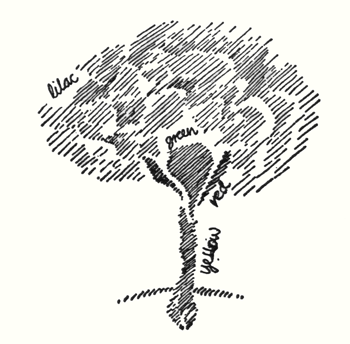
In a poisonous plant, however, it is different. In a poisonous plant the astrality penetrates into the actual substance of the plant and combines with it. A plant such as belladonna or, let us say, henbane, hyoscyamus, sucks in the astrality either strongly or more moderately and so bears astrality within itself—in an uncoordinated state, of course, for if it were coordinated the plant would have to become an animal. It does not become an animal; the astrality within it is in a compressed state.
As a result, interaction takes place between what is present in a plant saturated with astrality and the processes of assimilation in the animal and human organisms. If we eat plants that are not poisonous, we absorb not only those constituents of the plant which the chemist works up in the laboratory, not only the actual substance of the plant but also the etheric life forces ; but we must, as I have said here before, destroy the substance completely during the process of nutrition. In feeding on what is living, man must kill it within himself. That is to say, within his own organism he must expel the etheric from the plant-substance.
In the lower man, in the metabolic system, the following remarkable process takes place. When we eat plants, that is to say, vegetable substance—the same also applies to cooked foodstuffs but it is specially marked when we eat raw pears, or raw apples, or raw berries—we force out the etheric and absorb into our own ether-body the dynamic structure which underlies the plant. The plant has a definite form, a definite structure. It is revealed to clairvoyant consciousness that the structure we thus take into ourselves is not always identical with the form we see externally. It is something different. The plant-structure rises up within us and adapts itself to the organism in a remarkable way.
And now something very strange occurs. Just suppose—I must speak rather paradoxically here but it is exactly how things are—suppose you have eaten some cabbage. A definite form (blue in diagram) becomes visible in the lower man as a result, and activity is generated there.
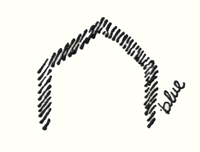
To the extent to which this activity is generated in the lower man through the eating of cabbage, the actual negative of the process makes its appearance in the upper man, the head-man. So having sketched the form which appears in the lower part of the organism, I now sketch in the upper man a hollow form (blue, red).

It is actually the case that the eating of the cabbage produces in us a definite form or structure and that the negative of it appears in our head.
And into this negative we now receive the impressions of the external world. This is possible because we have the hollow space within us—I am of course speaking approximately—and all nutritive plants have this effect.
If we have eaten something that is usually known as a foodstuff, the cohesiveness of its form is only strong enough to persist for twenty-four hours, in the course of which we must continually be dissolving it; one period of waking and sleeping dissolves it and it must again and again be formed anew. This is what happens when we have eaten nutritive plants—plants which have a physical body and an etheric body in their natural growth and do not allow the astrality to do more than play around them.
But now let us suppose that we drink the juice of henbane. Henbane is a plant that has sucked astrality into itself and consequently has a much more strongly cohesive form. In the lower man, therefore, there is a much firmer form which cannot easily be dissolved and which actually asserts its independence! Consequently the corresponding negative is more pronounced.Now suppose some human being has a brain with a structure that is not properly maintained. He tends to lapse into clouded, somnolent states because his astral body is not established firmly enough in the physical body of his brain. He drinks the juice of henbane and that produces in him a firm plant-form which in turn gives rise to a strong negative. And so by energizing the etheric body of his lower body and bringing into it a firm form through the taking of henbane, clearly defined thoughts may arise in a person whose brain was, so to speak, too soft, and the clouded state may pass away. Then, if in the rest of his organism he is strong enough—he may often be ordered this medicine for his condition—if he is strong enough to rouse the corresponding life-forces into activity and his brain is again in order, a poison such as this may help him to overcome his tendency to lapse into somnolent states.
Belladonna, for example, has a similar effect. Let me indicate in a sketch the effect it produces.
By taking belladonna the etheric body is reinforced by strong ‘scaffolding’. Hence when belladonna is taken in a suitable dosage which the patient can stand—after all, one can be cured by a remedy only if one can stand it—then a strong scaffolding is built, as it were, within the etheric body of the lower man. This strong scaffolding produces its negative in the head. And upon this reciprocal action of positive and negative depends the healing process we expect from belladonna.
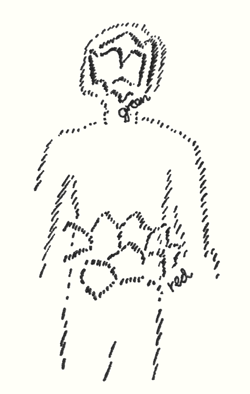
You must, however, be clear that when dealing with such effects, the factor of spatial distance can be ignored. The man of today, with his lifeless but massive intellect, imagines that if something is going on in his stomach it can get into his brain only if it visibly streams upwards. This, however, is not the case; processes in the lower body generate processes in the head as their counterpart and spatial distance does not come into consideration. If one is able to observe the etheric body, it can be seen distinctly how a form lights up in the etheric body of the lower body (red in diagram), while in the etheric body of the head, now darkened, the form is reproduced in negative.
You can perceive for yourselves that Nature everywhere tends to produce such phenomena. You know that a properly formed wasp has a kind of head in front, a kind of hind-quarter, and wings. That is a properly formed wasp.
But there are also wasps which look like this (lower form in diagram). They have a sting and drag their hind-quarters after them: the gall-flies. And even in the physical sphere, this appendage between the front part of the body and the hind-quarter is reduced to a minimum; the sting is greatly reduced.
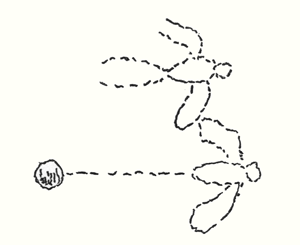
As soon as one enters the spiritual realm, no visible sting is necessary any longer. And when you come across certain beings in the elemental world—you remember that I spoke to you not long ago about the elemental kingdoms—you may see, for example, some being ... then there is nothing ... far away there is a different being. And gradually it dawns on you that the beings belong together; where the one goes the other also goes. So you may find yourself in the remarkable position—in the elemental world it can indeed be so—of discovering that here there is one part of an elemental-etheric organism, and there the other part; then one part may have turned round, but when this happened the other part cannot move directly to a new position but must follow the path taken by the first.
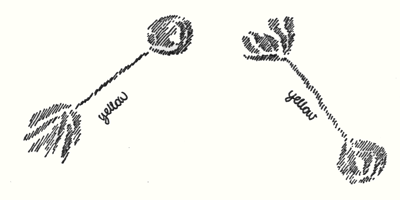
So you see, for those substances which neither the human nor the animal organism can immediately destroy, which produce a stronger and more lasting scaffolding, it is a matter of finding a connection with what, in a quite different part of the human organism, can also work constructively and with healing effects.
This gives you a vista of how the world can again become living and be revealed as such to man. Today, having only a heritage from the spiritual world, man has no possibility of approaching the living environment. He will, however, one day understand it again, he will again perceive how physical thinking is related to the whole universe. Then the universe will help him to discover why things are connected in this way or in that, why, let us say, the relation of a non-poisonous plant to the human and animal body is different from that of a poisonous plant. Only in this way is a re-vitalizing of the whole of human existence possible.
Now this may cause the modern comfort-lover to say: the men of old were far better off than we are, for the surrounding ether still worked upon them and they had living thoughts; they still understood such matters as the essential difference between poisonous and non-poisonous plants.—You know, of course, that animals still understand this difference, for they have no abstract thoughts to detach them from the world. Hence the animals are able through instinct to distinguish poisonous from non-poisonous plants.
Yes, but it must be emphasized over and over again that under such conditions man would never have been able to exercise his freedom. For what keeps us inwardly living—even in our thoughts—robs us of freedom. However paradoxical it may seem, with respect to the thoughts belonging to earlier earthly lives, we must each become an empty nothingness; then we can be free. And we become a nothingness when we receive into ourselves as corpses the living thoughts which were ours in pre-earthly existence, receive them into ourselves, that is to say, in their condition of ‘non-being’. Therefore with our dead thoughts we really go about as blanks in our waking life on Earth as far as our soul-life is concerned. And only out of this state of blankness or nothingness can our freedom become reality.
This is quite comprehensible. But we can understand nothing truly if we have nothing living within us. We can understand what is dead, but that will not bring us a single step further in our living relation to the world. And so, while safeguarding our freedom in face of the interruption in understanding that has come about, we must achieve new understanding by beginning now, in earthly existence, to give life to our thoughts by the power of our will. At every moment we can distinguish between living and dead thoughts. When we rise to the level of pure thinking—I have spoken of this in the book, The Philosophy of Freedom—we can be free men. If we fill our thoughts with feeling we shall, it is true, leave freedom aside, but in compensation we shall renew our connection with the environment. We participate in freedom through the consciousness that we are always capable of approaching nearer and nearer to pure thought, and in acts of moral intuition draw from it moral impulses.
Thereby we become free men; but we must first regulate our inner life of soul, the inner disposition of our soul, through our own deeds on Earth. Then we can take the results of those deeds with us through the gate of death into the spiritual world. For what has been achieved by individual effort does not go to waste in the universe.
I may have demanded difficult thoughts from you today but you will realize on reflection that we come nearer to understanding the world by learning to understand man, and especially the relation of physical man—the apparently physical man for he is really not a physical man alone, being permeated always by the higher members of his organism—to the other aspects of the physically manifested world, as we have learnt to know it from the example of poisonous plants.

